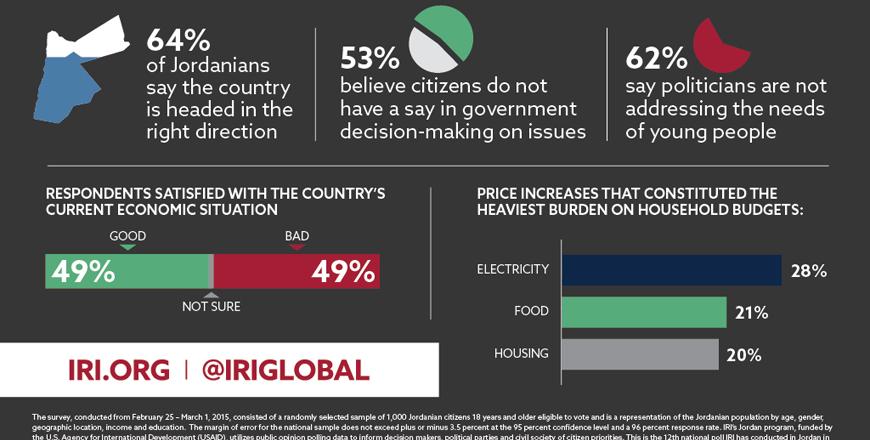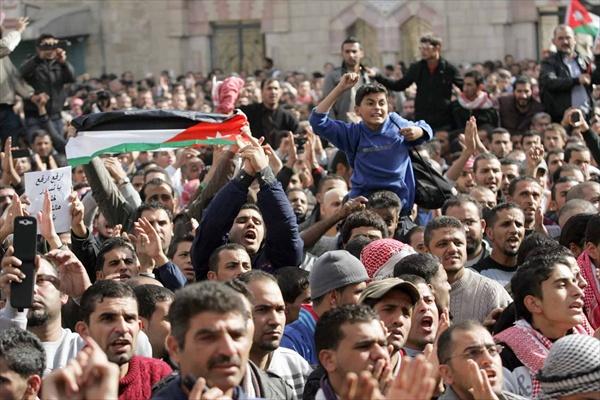You are here
Majority of Jordanians believe country is going in the right direction — poll
By JT - Jun 07,2015 - Last updated at Jun 07,2015

AMMAN — Jordanians are optimistic about the direction of their country despite mixed attitudes about the economy and emerging concerns about terrorism, according to a recent poll.
Conducted between February 25 and March 1 this year by the International Republican Institute (IRI) and Middle East Marketing and Research Consultants (MEMRC), the poll covered a randomly selected sample of 1,000 Jordanians eligible to vote who represented the Kingdom's population by age, gender, geographic location, income and education.
"Low confidence in Parliament and political parties remains; however, most Jordanians are also interested in political reforms," an IRI statement said.
A majority of Jordanians (64 per cent) think their country is going in the right direction, largely due to a common sense of stability and security, according to the survey.
“Security is obviously important to Jordanians and they support the steps being taken by their government, especially given the levels of violence we see in neighbouring countries like Syria and Iraq,” the statement quoted IRI Middle East Director Scott Mastic as saying.
“Still, the regional threat posed by ISIS (Daesh terror group) makes terrorism register as a front of mind issue in Jordan for the first time,” he added.
For the first time in an IRI survey, a significant percentage of respondents (10 per cent) cited terrorism as the single biggest problem facing Jordan as a whole, behind a host of economic concerns that include unemployment, the rising cost of living and poverty, the statement said.
An overwhelming majority (89 per cent) consider Daesh to be a terrorist organisation and most (71 per cent) support Jordan’s involvement in the international campaign, according to the poll.
In spite of the perception of being on the right track, the country is evenly split on the current economic situation, with 49 per cent of respondents rating the economy as good or very good, and an equal percentage rating it bad or very bad.
The increased prices of electricity, food and housing now rank as the heaviest burdens on household budgets; a significant change from IRI’s 2013 poll, where housing did not even register and fuel dominated the list of concerns, the statement said.
These factors, along with concerns about corruption and unemployment, make respondents split on whether the economy will improve during the next 12 months, with 44 per cent expecting the general economic situation to improve and 50 per cent expecting it to stay the same or decline.
"These views impact the low level of public confidence in Parliament," with 53 per cent saying they have only some or very little confidence.
"Only 11 percent of respondents feel that the number of list seats in Parliament should increase, and 17 per cent said that the lists should be limited to political parties."
A strong majority (67 per cent) of respondents believe women should be equally represented in political decision-making processes and 62 per cent said they are likely to vote for a woman candidate.
Moreover, a majority (53 per cent) believes citizens do not have a say in government decision-making on issues that directly affect them, while 62 per cent say politicians are not addressing the needs of young people.
IRI’s Jordan programme, funded by USAID, utilises public opinion polling data to inform decision makers, political parties and civil society of citizen priorities, the statement said.
This is the 12th national poll IRI has conducted in Jordan in partnership with MEMRC.
Related Articles
AMMAN — Jordanians are less optimistic about the direction of their country than they were in September, but optimists remain a majority, ac
More Jordanians believe matters in the country are going in the wrong direction than those who feel they are on the right track, according to a recent poll conducted by the International Republican Institute (IRI).
Jordanians’ satisfaction with the performance of the incumbent government of Abdullah Ensour witnessed an increase four months since the last comprehensive poll by the University of Jordan’s Centre for Strategic Studies (CSS).

















